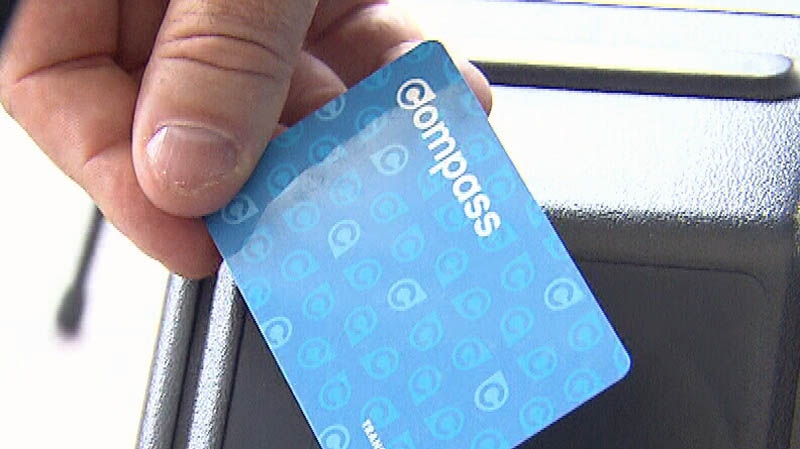TransLink has raised fares. Here's how much more a trip will cost you.
 TransLink is rolling out the Compass Card in late 2013. (CTV)
TransLink is rolling out the Compass Card in late 2013. (CTV)
An increase to Metro Vancouver's transit fares kicked in on Canada Day, making it a little bit pricier to get around the region this summer.
For adults, the cost of a single-zone trip when paying by cash or by tapping a credit card has gone up five cents, to $3.10. For two zones, the price is up 10 cents to $4.45 and for three zones, a 15-cent increase brings the cost of a trip up to $6.05.
Those who pre-load their compass cards will pay $2.50 for a one-zone fare, up from $2.45. For two and three-zone travel the price is up 10 cents, to $3.65 and $4.70 respectively.
The price for a monthly pass for adults has gone up by between $2.30 and $4.15.
Concession fares, for teenagers aged 13 to 18 and for seniors 65 and older, have also gone up five cents for one and two zones trips and 10 cents for three. Unlike for adults, these fares are the same regardless of method of payment. The monthly price for a concession pass, which entitles the rider to unlimited, three-zone travel, is up to $58.60.
Day passes are going up to $11 for an adult fare and $8.65 for a concession pass.
A planned fare hike of 4.6 per cent in 2020 was brought to a halt by the pandemic, and the increase in 2021 was also lower than initially planned.
TransLink, when announcing the increases for 2022, said this year's increase is lower, too, than was initially planned as the region continues to deal with the impacts of COVID-19.
Meantime, the agency has announced a campaign meant to encourage more people to go car-free this summer as large events are set to return to the city – including by offering discounts to people who take transit to some popular attractions or events.
CTVNews.ca Top Stories

Doctors ask Liberal government to reconsider capital gains tax change
The Canadian Medical Association is asking the federal government to reconsider its proposed changes to capital gains taxation, arguing it will affect doctors' retirement savings.
Keeping these exotic pets is 'cruel' and 'dangerous,' Canadian animal advocates say
Canadian pet owners are finding companionship beyond dogs and cats. Tigers, alligators, scorpions and tarantulas are among some of the exotic pets they are keeping in private homes, which pose risks to public safety and animal welfare, advocates say.
BREAKING Man wanted in connection with deadly shooting in Toronto tops list of most wanted fugitives in Canada
A 35-year-old man wanted in connection with the murder of Toronto resident 29-year-old Sharmar Powell-Flowers nine months ago has topped the list of the BOLO program’s 25 most wanted fugitives across Canada, police announced Tuesday.
Prince William and wife Kate thank public for birthday messages for son Louis
Prince William and his wife Kate thanked the public for their messages which had been sent to mark the sixth birthday of their youngest son Louis on Tuesday.
She was the closest she'd ever been to meeting her biological father. Then life dealt her a blow
Anne Marie Cavner was the closest she'd ever been to meeting her biological father, but then life dealt her a blow. From an unexpected loss to a host of new relationships, a DNA test changed her life, and she doesn't regret a thing.
How quietly promised law changes in the 2024 federal budget could impact your day-to-day life
The 2024 federal budget released last week includes numerous big spending promises that have garnered headlines. But, tucked into the 416-page document are also series of smaller items, such as promising to amend the law regarding infant formula and to force banks to label government rebates, that you may have missed.
Fire engulfs old Edmonton municipal airport hangar
A historical hangar at the former Edmonton municipal airport beside the NAIT main campus was on fire Monday night.
Soft skills, preparation can help new graduates land jobs, experts say
As new graduates enter the workforce over the next few weeks, they are likely to face challenges getting their foot in the door and must be prepared to effectively communicate what they bring to the company.
RCMP uncovers plot to sell drones and equipment to Libya
The RCMP says it has uncovered a ploy to sell Chinese drones and military equipment to Libya illegally.
































